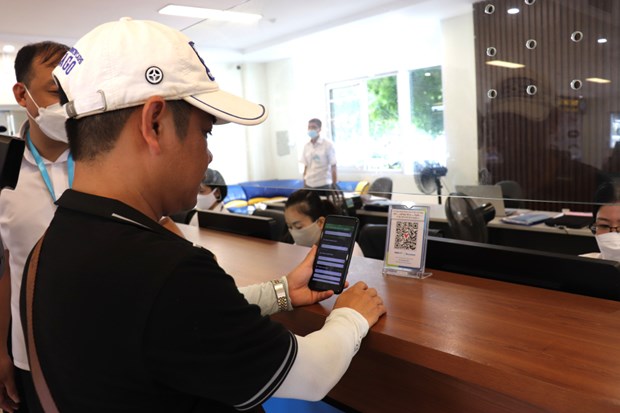Quang Ninh develops digital economy
 Scanning QR code to pay for tickets to visit Ha Long Bay (Source: baoquangninh.com.vn)
Scanning QR code to pay for tickets to visit Ha Long Bay (Source: baoquangninh.com.vn)Quang Ninh (VNA) – The northern province of Quang Ninh is promoting the development
of its digital economy to increase production value, improve growth quality, local
living conditions as well as the province’s competitiveness, in the context of
the Fourth Industrial Revolution creating great impacts on all aspects of
social and economic life.
In the first half of this year, Quang Ninh focused attention on expanding its
e-commerce market for local products under the OCOP (One Commune, One Product) plan.
Out of a total 267 local OCOP products rated as three-star or higher, 177 have
been sold on the Postmart.vn and Voso.vn e-commerce platforms.
Quang Ninh-based businesses and organisations are also striving to switch to the
electronic invoice system. So far, 9,327 firms and organizations have
registered their e-invoices. Quang Ninh is one of the first six provinces and centrally-run
cities to successfully launch the first stage of the system, thus creating favourable
conditions for firms and saving payment times.
According to Deputy Director of the Ha Long Bay Tourism Guide and Operation
Centre Vu Duc Minh, the centre considers digitalisation an inevitable process
and part of the digital transformation underway in the province. The centre has
digitalized the sale of sightseeing tickets on Ha Long Bay, enabling the payment
of tickets by scanning QR code. In the near future, in order to catch up with the
trend of digital transformation, the Ha Long Bay Management Board will
digitalise its information system, launch an automatic ticket system and a
virtual tour guide using artificial intelligence, among others, thus offering a
more modern and civilised tourism environment at the World Cultural Heritage
site.
The province has also invested in a digital border gate platform. The
provincial Department of Information and Communications is working with relevant
agencies and units to pilot a digital border gate model at Mong Cai
International Border Gate (Bac Luan Bridge Area II, Mong Cai city) before expanding
it to other border gates in the province.
Quang
Ninh said the basic goal is that by 2025, the digital economy will account for
at least 20% of the province's gross regional domestic product (GRDP). The ratio
of the digital economy in each sector and aspects should be at least 10%. The
province will also strive to attract 50 digital enterprises, including at least
three start-ups and innovative companies operating in digital products and
services. Over half of small and medium-sized enterprises (SMEs) in the
province will use digital platforms. The workforce in the digital economy will
account for over 2% of the total, while 100% of business households and
enterprises will have access to and be capable of using digital platforms. The
Ha Long ICT Park will be built in Ha Long city and become a “Data Port” and an
innovation centre in the north.
In 2022, the digital economy will account for 8% of the province’s GRDP, of
which the manufacturing and processing industry will make up 40%,
mining 30%, digital trade 10%, energy 10%, agriculture 5%, and
seaport-logistics 5%. Up to 40% of SMEs will use digital platforms and 100% of
businesses will use e-invoices. E-commerce revenue will account for 10% in the
total retail revenue of goods and services, while 100% of OCOP products, key
agricultural products and 80% of local farm produce will have their origins
traced and sold online.
To this end, the province will first of all accelerate digital transformation
in key sectors such as industry, manufacturing and processing, mining, energy,
agriculture, transport and smart logistics, digital border gate, tourism and
border economy.
Chairman of the provincial Business Association Pham Van The said in the near
future, the association will work closely with departments and agencies,
especially the Department of Information and Communications, to assist SMEs in
digital transformation. It will also build and synchronously deploy an index
assessing digital transformation among enterprises, thereby gauging the
effectiveness of support programmes for firms in this effort. At the same time,
the province will develop digital payments and promote cashless payments, with
priority given to regions and areas with low banking coverage.
Support will be given to e-commerce to improve its competitiveness and
sustainable development, including the operation and upgrade of Quang Ninh’s
OCOP e-commerce platform to meet the demands of businesses and consumers.
Digital technology will be used to create a healthy business environment,
spread digital banking models, improve provincial competitiveness and
administrative reform indices, and establish smart industrial zones./.













